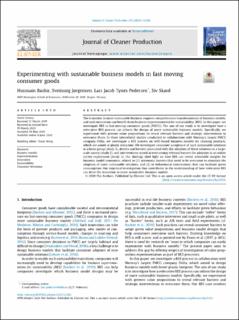| dc.contributor.author | Bashir, Hussnain | |
| dc.contributor.author | Jørgensen, Sveinung | |
| dc.contributor.author | Pedersen, Lars Jacob Tynes | |
| dc.contributor.author | Skard, Siv E. Rosendahl | |
| dc.date.accessioned | 2020-12-22T08:55:26Z | |
| dc.date.available | 2020-12-22T08:55:26Z | |
| dc.date.created | 2020-07-22T08:41:51Z | |
| dc.date.issued | 2020 | |
| dc.identifier.citation | Journal of Cleaner Production. 2020, 270 . | en_US |
| dc.identifier.issn | 0959-6526 | |
| dc.identifier.uri | https://hdl.handle.net/11250/2720700 | |
| dc.description.abstract | The transition to more sustainable business requires comprehensive transformations of business models, and such innovation can benefit from business experimentation for sustainability (BES). In this paper, we investigate BES in fast-moving consumer goods (FMCG). The aim of our study is to investigate how a reiterative BES process can inform the design of more sustainable business models. Specifically, we experiment with greener value propositions, to reveal relevant barriers and strategic interventions to overcome them. In three interrelated studies conducted in collaboration with Norway’s largest FMCG company Orkla, we investigate a BES process on refill-based business models for cleaning products, which are aimed at plastic reduction. We investigate consumer acceptance of such sustainable solutions in a focus group (study 1), drivers and barriers associated with the adoption of these solutions in a large-scale survey (study 2), and interventions aimed at overcoming relevant barriers for adoption in an online survey experiment (study 3). Our findings shed light on how BES can reveal actionable insights for business model innovation, related to (1) systematic barriers that need to be overcome to stimulate the adoption of more sustainable solutions, and (2) to behavioural interventions that can facilitate green consumption. Our empirical investigation thus contributes to the understanding of how reiterative BES can drive the transition to more sustainable business models. | en_US |
| dc.language.iso | eng | en_US |
| dc.rights | Navngivelse 4.0 Internasjonal | * |
| dc.rights.uri | http://creativecommons.org/licenses/by/4.0/deed.no | * |
| dc.subject | business models | en_US |
| dc.subject | experimentation | en_US |
| dc.subject | innovation | en_US |
| dc.subject | sustainability | en_US |
| dc.subject | consumer behaviour | en_US |
| dc.title | Experimenting with sustainable business models in fast moving consumer goods | en_US |
| dc.type | Peer reviewed | en_US |
| dc.type | Journal article | en_US |
| dc.description.version | publishedVersion | en_US |
| dc.source.pagenumber | 0 | en_US |
| dc.source.volume | 270 | en_US |
| dc.source.journal | Journal of Cleaner Production | en_US |
| dc.identifier.doi | 10.1016/j.jclepro.2020.122302 | |
| dc.identifier.cristin | 1820114 | |
| cristin.ispublished | true | |
| cristin.fulltext | original | |
| cristin.qualitycode | 2 | |

